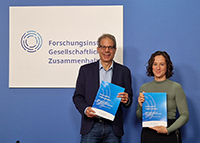 Prof. Dr. Olaf Groh-Samberg (FGZ Bremen), Clara Dilger (FGZ Leipzig)
Prof. Dr. Olaf Groh-Samberg (FGZ Bremen), Clara Dilger (FGZ Leipzig)The first cohesion report by the Research Institute for Social Cohesion (RISC) shows that large sections of the population in Germany have homogeneous circles of acquaintances - and this also influences their world views and experiences. According to the report, the strongest tendency towards network segregation is found among AfD and Die Grünen voters, as well as among highly educated, Muslim and rural population groups. The report is the result of a representative longitudinal study with more than 12,000 respondents. The report focuses on the connection between homogeneous circles of acquaintances and ideals of social coexistence, attitudes towards democracy, experiences of cohesion in the living environment and emotions towards other social groups.
There are hardly any points of contact between many people in Germany, they keep to themselves and move in everyday "bubbles" - this is a popular diagnosis of the times. The first cohesion report presented today by the Research Institute for Social Cohesion examines the truth behind this widespread assumption and the role that the composition of acquaintances plays in social cohesion in Germany.
With the first survey wave of the long-term RISC cohesion study (Social Cohesion Panel), a very large, representative data set for Germany is now available for the first time, which makes it possible to analyze a broad spectrum of attitudes, experiences, emotions and practices of people from all social groups, milieus and regions in the context of their lifestyles and socio-structural backgrounds in a differentiated manner. On this basis, it is also possible for the first time to present empirically validated conclusions on questions of social cohesion in relation to the significance of the composition of the respondents' circles of acquaintances. These findings provide important insights into the spread and mode of action of the "bubbles" in everyday life that are often cited in the media.
Prof. Dr. Olaf Groh-Samberg, RISC spokesperson and one of the main authors of the study, explains: "Our report shows that the proverbial 'filter bubbles' also exist in the 'analog world': People whose social circles of acquaintances tend to be homogeneous in composition also think, feel and act differently from people who move in more mixed networks. The latter can help to break down barriers to understanding and hostility between social groups."
Further key findings of the Cohesion Report are briefly summarized below.
Homogeneous social networks: especially among Die Grünen and AfD supporters
We find a particularly strong tendency to "keep to themselves", especially among Die Grünen and AfD sympathizers: 50 percent of potential AfD voters report that their circles of acquaintances are predominantly made up of AfD sympathizers; among potential Die Grünen voters, as many as 62 percent have politically homogeneous networks. This tendency towards network segregation is also pronounced among people of Muslim faith, low education and rural residential areas, as well as among East Germans, the rich and highly educated.
Attitudes towards democracy: you have to be able to afford to trust
There are clear differences in attitudes towards democracy according to education level and income: People with socio-economically privileged networks tend to exhibit high levels of political trust, relatively high levels of satisfaction with democracy and, to a lesser extent, populist attitudes. In contrast, people with less educated or economically disadvantaged acquaintances show less trust in political institutions, a low level of satisfaction with democracy and a higher level of populist attitudes.
Negative emotions towards other social groups
In Germany, "affective polarization" - the exaggerated emotional identification with one's own group while simultaneously devaluing the other group - is found primarily between competing political camps (left vs. right and Die Grünen vs. AfD). While people who intend to vote for the Gründe have a very positive attitude towards other people who sympathize with Die Grünen, they strongly reject people who sympathize with the AfD. Potential AfD voters, on the other hand, rate other AfD supporters as very likeable and feel a pronounced aversion to Die Grünen supporters. For most social groups with homogeneous networks, the tendency towards affective polarization is also greater. This confirms the assumption that contacts and points of contact between social groups can mitigate hostility between these groups.
Conclusion: Network segregation favours polarization
Overall, the Cohesion Report shows that the social acquaintance networks of Germans are by no means completely decoupled, but are nevertheless homogeneous and segregated to a considerable extent. For the various social characteristics considered in the study, different manifestations and effects of segregation can be seen. A lifeworld "decoupling" of social groups with opposing attitudes and values as well as hostile feelings is particularly evident between the political camps of Die Grünen and AfD supporters.
The detailed cohesion report and an abridged version are available free of charge on the RISC website: https://fgz-risc.de/zusammenhaltsbericht
Press contact
Sarah Lempp
Head of Press and Public Relations
Research Institute for Social Cohesion
E-mail: presse@fgz-risc.de
Phone: +49 341 9737762











